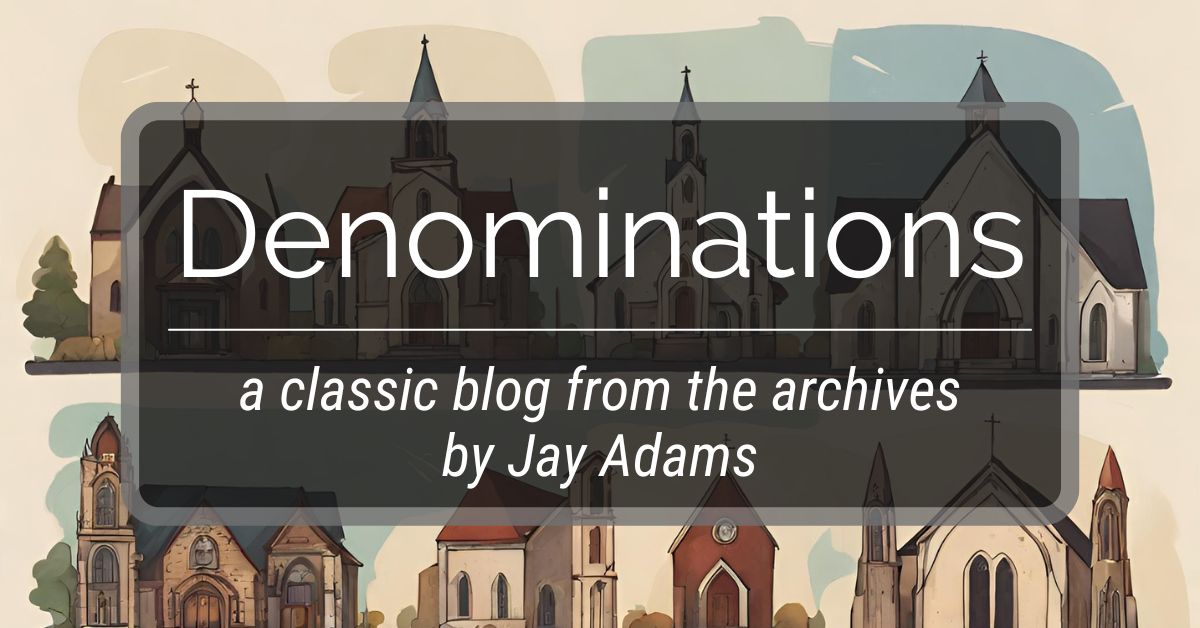“Now there’s another one.”
What are you talking about?
“Denominations.”
Denominations?
“Yep. Every time I turn around there seems to be a new one I never heard about before. Since the Anglicans split, we now have two Episcopal churches in the USA.”
Wrong. Back in 1873 the first split took place, and the Reformed Episcopal Church was begun. They have a seminary in Philadelphia and one in South Carolina. They divided over sacerdotalism. But, apart from that, what bothers you about denominations?
“Just that there are so many. Can’t understand why people can’t get along with each other, and why they have to keep on splitting.”
Would you like me to take a shot at answering?
“If you can.”
Well, there are many reasons for the situation. I’ll grant you that some of them are quite wrong and only have to do with power grabs, and so forth. And, even when there’s a better reason, some of that sort of thing can get mixed in and confuse people. But there is one fundamental reason for the problem. Paul explained in 1 Corinthians 11:19:
. . . there must be factions among you so that it may appear who is approved among you.
In that passage, he was dealing with factions within a congregation, but the principle applies to broader factions as well.
“Then, it sounds like Paul thought that divisions were a good thing?”
No. No. He wasn’t commending the Corinthians for their factious spirit—rather he condemned it. But, at the same time, he made it clear that, sometimes, something wrong can be necessary to produce something right.
“Sounds fishy to me—please explain.”
In order to determine who is right, issues must often come to a head. They can’t—shouldn’t be—ignored when truth is at stake. Now, we’re not talking about mere differences of opinion, but whether God’s truth and His work is at stake. Whether or not such matters as the Gospel are up for grabs. That sort of problem often results in division.
At least, when the division occurs, issues—often swept under the rug for years—surface. If they are of importance, they ought to be brought to light so that people can become aware of, and avoid, any heresy that exists. In the recent Episcopal division, for instance, liberalism, and even the ordination of so-called “gays,” became visible to the public.
“Hmmmmm. I think I see. But I don’t like it.”
Neither do I. But we live in a world of sin—and that means much that we don’t like will take place.
“Guess you’re right.”
Check out our online courses, including, Introduction to Nouthetic Counseling and The Use of Scripture in Counseling, taught by Jay Adams!
Books related to counseling others:
- Competent to Counsel by Jay Adams
- The Christian Counselor’s Manual by Jay Adams
- How to Help People Change by Jay Adams
- Check out our Bookstore for all the best counseling books!
The Christian Counselor’s New Testament and Proverbs, translated by Jay Adams
Visit our online bookstore for all your biblical counseling resource needs.
For more biblical counseling training, check out our list of INS Online Courses.
Follow INS on Social Media:
– Facebook: noutheticstudies
– Twitter: @noutheticstud
– Instagram: @noutheticstudies

